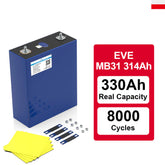How Many Cycles Does a 100Ah Battery Last Exploring Battery Lifespan
A 100Ah battery is a popular choice for solar energy storage, RVs, boats, and backup power systems. However, many users wonder, how long does a 100Ah battery last and what factors influence its lifespan? The number of cycles a battery can complete before its capacity degrades is crucial in determining its overall longevity.
In this article, we will explore the lifespan and cycle count of a 100Ah battery, the different types available, and how to extend its durability for optimal performance.
- Understanding the Lifespan of a 100Ah Battery
- How Many Cycles Does a 100Ah Battery Last?
- How Long Can a 100Ah Battery Power Different Devices?
- How to Extend the Lifespan of a 100Ah Battery
- Comparing 100Ah Battery Types for Different Applications
Understanding the Lifespan of a 100Ah Battery
What Does 100Ah Mean?
The 100Ah rating indicates that the battery can deliver 100 amps for one hour or 10 amps for 10 hours, depending on the load and discharge rate. However, its actual runtime depends on factors such as voltage, depth of discharge, and battery chemistry.
For example, a 100Ah 12V battery has a total energy capacity of:
100Ah×12V=1200Wh100Ah \times 12V = 1200Wh
This means the battery can power a 100W device for approximately 12 hours before needing a recharge.
Factors Affecting the Lifespan of a 100Ah Battery
The lifespan of a 100Ah battery is determined by:
- Battery Chemistry – Lithium-ion, lead-acid, and AGM batteries have different cycle life ratings.
- Depth of Discharge (DoD) – How much capacity is used per cycle affects longevity.
- Temperature Conditions – Extreme heat or cold can shorten battery life.
- Charging and Discharging Rates – Faster discharges reduce overall lifespan.
- Maintenance and Storage – Proper care improves longevity.
>>See also Calculadora de conversión de amperios-hora a vatios-hora (Ah a Wh)
How Many Cycles Does a 100Ah Battery Last?
Cycle Life of Different 100Ah Battery Types
A battery's lifespan is measured in cycles, which refer to a full charge and discharge process. Here’s a comparison of different 100Ah battery types and their estimated cycle life:
|
Battery Type |
Cycle Life (at 50% DoD) |
Cycle Life (at 80% DoD) |
Cycle Life (at 100% DoD) |
|
Lead-Acid (Flooded) |
500-700 cycles |
300-500 cycles |
200-300 cycles |
|
AGM (Absorbent Glass Mat) |
600-1000 cycles |
400-700 cycles |
250-400 cycles |
|
Gel Battery |
800-1200 cycles |
500-800 cycles |
300-500 cycles |
|
Lithium Iron Phosphate (LiFePO4) |
3000-5000 cycles |
2000-4000 cycles |
1000-3000 cycles |
As seen in the table, lithium batteries offer significantly more cycles than lead-acid batteries and are a better long-term investment despite their higher upfront cost.
How Depth of Discharge Affects a 100Ah Battery’s Lifespan
The depth of discharge (DoD) plays a crucial role in determining how long a 100Ah battery will last.
- Lead-acid batteries should only be discharged to 50% for maximum lifespan.
- Lithium batteries can handle 80%-100% DoD without significant degradation.
For example, if a lead-acid 100Ah battery is discharged daily to 50%, it may last around 1000 cycles. However, if discharged to 80%, its lifespan could drop to 500 cycles.
How Long Can a 100Ah Battery Power Different Devices?
Powering Household and Camping Appliances
A 100Ah battery can power various devices, but actual runtime depends on the wattage of the appliance. The formula to calculate runtime is:
Runtime (hours)=Battery Capacity (Wh)Device Power (W)\text{Runtime (hours)} = \frac{\text{Battery Capacity (Wh)}}{\text{Device Power (W)}}
For a 100Ah 12V battery (1200Wh capacity):
|
Device |
Power Consumption (W) |
Estimated Runtime (Hours) |
|
LED Light (10W) |
10W |
120 hours |
|
Laptop (50W) |
50W |
24 hours |
|
Mini Fridge (60W) |
60W |
20 hours |
|
TV (100W) |
100W |
12 hours |
|
CPAP Machine (40W) |
40W |
30 hours |
|
Electric Kettle (1500W) |
1500W |
0.8 hours |
These calculations assume 100% efficiency, but real-world usage may be lower due to battery inefficiencies and power losses.
How to Extend the Lifespan of a 100Ah Battery
Proper Charging Practices
- Use the right charger – A smart charger prevents overcharging and undercharging.
- Avoid deep discharges – For lead-acid batteries, keep DoD at 50% or less for maximum lifespan.
- Charge lithium batteries fully but avoid 100% charging when possible.
Temperature Management
- Keep batteries cool – Avoid exposure to direct sunlight or extreme heat.
- Use insulation in cold weather – Freezing temperatures can reduce battery efficiency.
Regular Maintenance and Storage
- Lead-acid batteries require water level checks and terminal cleaning.
- Lithium batteries need minimal maintenance but should be stored at 40-60% charge when unused.
>>See also Everything You Need to Know About Power Wheels Batteries
Comparing 100Ah Battery Types for Different Applications
Best 100Ah Battery for Solar Systems
- Lithium Iron Phosphate (LiFePO4) is the best choice due to high cycle life and deep discharge capability.
- AGM or Gel batteries are suitable for off-grid applications with moderate usage.
Best 100Ah Battery for RVs and Boats
- Lithium batteries offer lighter weight and faster charging, making them ideal for mobile applications.
- AGM batteries are a good alternative for those on a budget.
Best 100Ah Battery for Backup Power
- Lead-acid batteries work well for occasional backup use.
- Lithium batteries are better for frequent deep discharges in emergency power systems.
A 100Ah battery’s lifespan depends on multiple factors, including battery chemistry, depth of discharge, charging habits, and environmental conditions.
- Lead-acid batteries last 500-1000 cycles if well-maintained.
- Lithium batteries can exceed 3000-5000 cycles, making them a more cost-effective long-term solution.
- Proper care and usage can significantly extend the life of a 100Ah battery, ensuring you get the most value from your investment.
By understanding the cycle life and factors affecting battery longevity, you can make an informed decision when selecting the best 100Ah battery for your specific needs.
























Leave a comment
All blog comments are checked prior to publishing